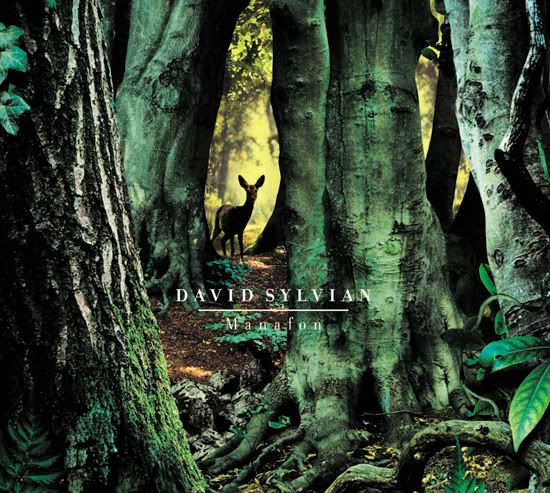
In this new semi-regular series, I write about tracks that particularly move and impress me. Take a listen and join the conversation!
On his 2003 album Blemish, one-time Japan vocalist David Sylvian collaborated with experimental musicians Derek Bailey and Christian Fennesz to create a stark, low-key accompaniment to his warm, florid vocals. His subsequent album, Manafon, released just last year, takes this approach even further, collaborating with a whole host of avant-garde musicians and improvisers to create a stripped-down, nearly bare sonic setting for Sylvian's voice. The lead-off track, "Small Metal Gods," opens with the spinning clatter of Otomo Yoshihide's record-less turntable and the hissing static of Toshimaru Nakamura's no-input mixing board, "empty" instruments that spit out abstract sheets of noise. These hesitant introductory scratches are soon joined by the spacious, reverberating notes of Burkhard Stangl's acoustic guitar and the quiet scrape of Michael Moser's cello, and then Sylvian's voice, over-ripe and thick with emotion as ever, pours into this unsettled, sizzling atmosphere. Sylvian's vocals — "it's the farthest place I've ever been/ it's a new frontier for me" are his first lines, suggesting his embrace of innovation here — are always front and center, with his collaborators filling in the niches and hollow spaces between his words. Their spare, minimalist accompaniment creates a powerful tension between foreground and background, as whenever Sylvian's voice drops out, it creates a sensation of profound absence, of negative space in which the music's scrape-and-sizzle minimalism only pricks lightly against the silence. This is music with a real sense of drama, even melodrama, akin to Scott Walker's art songs but without the bombast; Sylvian's music is resolutely dark and introspective.

4 comments:
I wasn't familiar with Sylvian before this post Ed, but after listening to the song a few times, I have to say that it really is quite powerful. This is the kind of minimalist songwriting I gravitate towards. I love how sparse yet profound it feels, layered with all kinds of poignant pops and plucks and scratches that are incredibly effective working behind Sylvian's deeply emotive voice. And the lyrics are pretty damn interesting as well. Great stuff.
Thanks again for exposing me to another promising artist, Ed. This is an excellent feature, look forward to more in the future.
I'm glad you enjoyed this, Drew. Manafon is a fantastic album, one of my favorites from this year, and the whole thing is in a very similar vein to this track. As I mentioned in the blurb, Blemish, from a few years back, started this particular strain of Sylvian's music. It's not quite as minimal or austere, but otherwise similarly allows that amazing voice to hover above the sizzling soundscapes.
Before these two albums, Sylvian generally mined a comparatively accessible art-pop sound, which some people love but I'm a little ambivalent about. I think he's really re-invented himself in fascinating ways with these two most recent albums. It's great to see someone who's been at this so long embracing younger avant-garde musicians and experimenting with his sound.
I was in Drew's boat, and I checked out some of Sylvian's stuff last night. He's got a fantastic voice, and the Scott Walker comparison is dead-on. I took a broad sampling of him and it's crazy to hear the jumps from, say, "Orpheus" to his work with Fripp to "Small Metal Gods." I can't wait to check this guy out more. I'm listening to Japan's Tin Drum now and I'm loving it.
Nice, I'm glad you're diving right in, Jake. I've yet to warm up much to earlier Sylvian, though Brilliant Trees is a pretty good album. I just love the way that rich, mannered voice gets tempered and challenged by the spikier intrusions of his collaborators on the recent albums. Sylvian's covered a lot of ground (art-pop, ambient, prog, etc.) even before his millennial re-invention, but Blemish and Manafon are so singular and so powerful that they stand out even in a career as varied and venerable as his.
Post a Comment